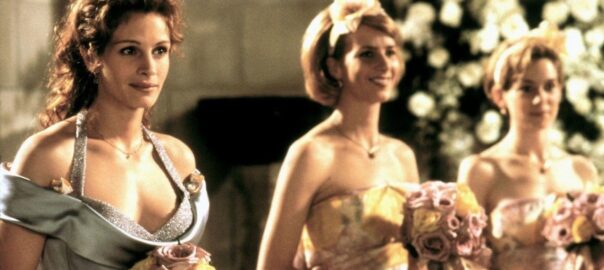[ad_1]
Dear Abby,
For twenty-five years, I have been trapped inside the 1997 Julia Roberts classic “My Best Friend’s Wedding.” Not the movie itself but the kitschy opening-credit sequence in which a buoyant, blond bride with a bouffant prances with her poofy pastel pals, lip-synching to Ani DiFranco’s cover of “Wishin’ and Hopin’ ” before the movie starts, never to be seen or heard from again.
I know you’re thinking, Is this another prank by my son-in-law? And Dylan McDermott, right?! I can only hope that you will sense honesty in my desperation. If this plea has slipped through space-time to reach you, if it has magically maneuvered its way out of the rom-com purgatory in which I find myself, please hear me out.
I was only seven when the film was released, and my malleable mind was completely transfixed. I watched it in theatres, on VHS, and, secretly, via pay-per-view in a Fort Lauderdale hotel room for fourteen dollars, five nights in a row, while my parents were out to dinner. Like any little girl at the time, I was obsessed with the idea of Ms. Roberts’s long red hair taking care of me, and with Frank Sinatra’s rendition of “The Way You Look Tonight.” Who was I to deny my juvenile consumerist urges? The film was foundational, instilling in me and in thousands of kids across the country the belief that if you do your hair the way your man wants, you, too, can wear long white satin gloves.
But then, somehow, after my hundredth rewatch and perfect reënactment of the dance routine, I found myself sucked into the movie. I can’t explain what happened, only that one moment I was holding my hairbrush as if it were a bouquet to coyly toss to my three white bridesmaids, and the next, I was transported to a windowless pink room with a grinning bridal party smelling of Aqua Net and Snapple. I know it sounds crazy, but so does grown-man Dermot Mulroney marrying a college-junior Cameron Diaz; Cameron Diaz being shy at karaoke; or a crowd forming around a “catfight” in the women’s restroom of Chicago’s Union Station as if it were a cage match.
I will admit that I felt a bit of excitement upon my arrival. Second grade was stressful, and my English teacher had already pulled me aside to ask why my poems were so dark and if things were O.K. at home. I thought that’s how poetry worked? I was playing to a crowd? You know who else did that? My four cool, new roommates. I was happy to have a break from the demands of Mavis Beacon and the humiliation of eating lunch with the teachers, and I had hoped that maybe these ladies would fawn over me. And they did. Those first few weeks, my new friends taught me how to apply makeup, wear exclusively taffeta, and think about “how great true love is.”
But time wore on, and I began to miss my parents, my Limited Too British-flag shirt, my dark poetry. The ladies wouldn’t stop asking when they could meet Julia. “I’m sorry, you never do,” I said, and they’d cry every time, as if one day my answer might change. “Are we not part of the actual film?” they’d ask, black mascara streaming down their faces. Eventually, I explained that their inclusion might be in fact ironic, alluding to just how silly the protagonist would be to pursue a man who is in love with a younger woman. (Not old—like, twenty-eight.) But they’ll never understand. As a kid, I grew tired of comforting these adult women and their huge boobs. They had so much that I didn’t have: bras, periods, purpose. And now I just can’t do it anymore.
Even more worrisome, I soon noticed that, while I aged, my fellow-hostages did not. They at first acted as my surrogate mother figures but soon became peers, and eventually little sisters. I matured past their universal “mid-twenties” and now find myself hurtling toward death. I am scared. I want to experience life! I want to go on adventures! Pursue an education! Fall in love! I am too old to be a young bride, but I remain hopeful that one day I will experience sex. Whenever I bring this up with the ladies, they become immediately uncomfortable. I suspect that they are also virgins. At one point in their dance, the bride removes one long satin glove and bites it, and everyone goes insane. These are not serious people.
When will I get to wear a lavender gown? Sing at a crab restaurant with my extended family? See my parents again? When will my gay best friend save me from embarrassment by calling me on the enormous leather-encased flip phone I carry in my hand at all times? I beg of you—what can I do to escape this prison with my dignity intact? I have missed twenty-five birthdays, twenty-five Christmases, and who knows how many friends’ weddings.
Yours,
Wishin’ and Hopin’ and Beggin’ for Help ♦
[ad_2]
Source link
